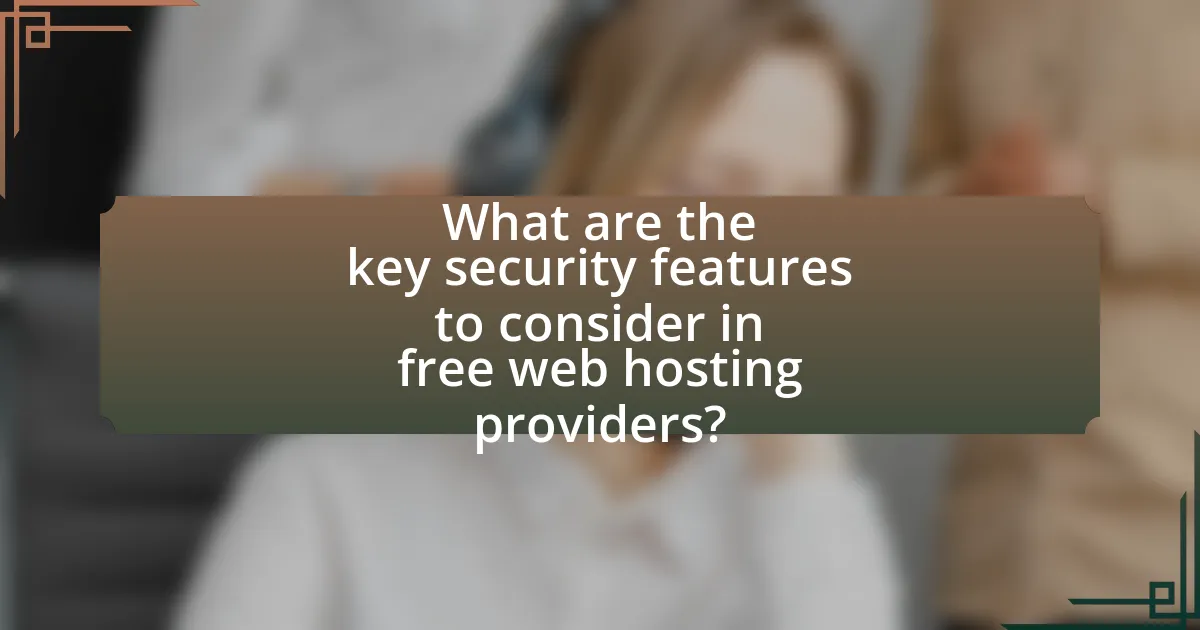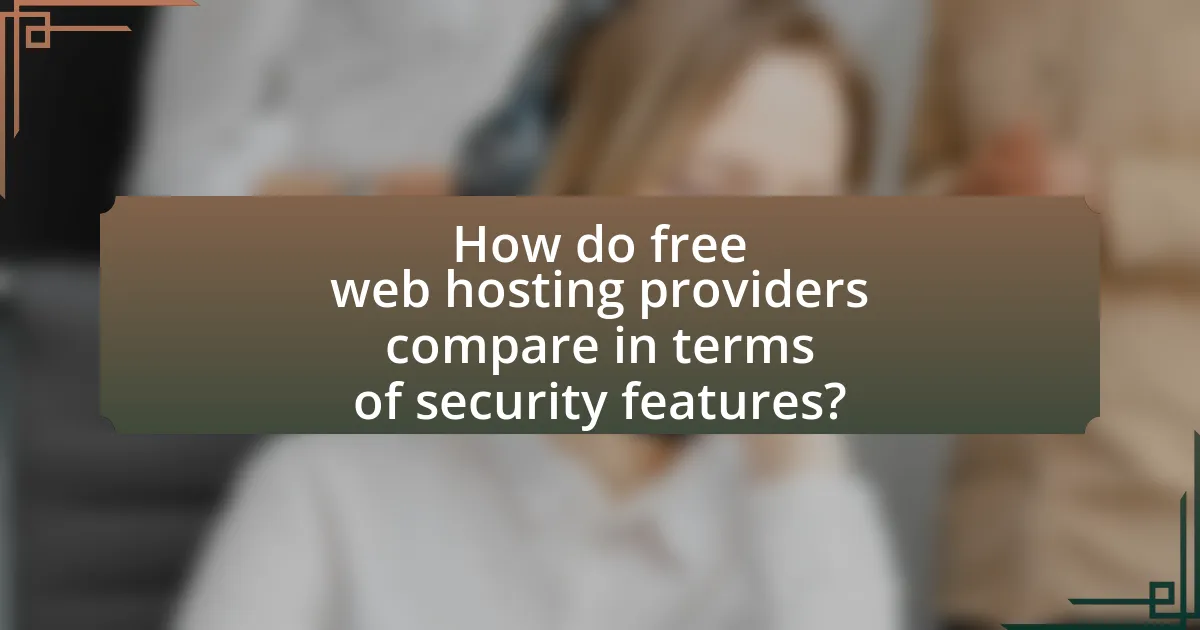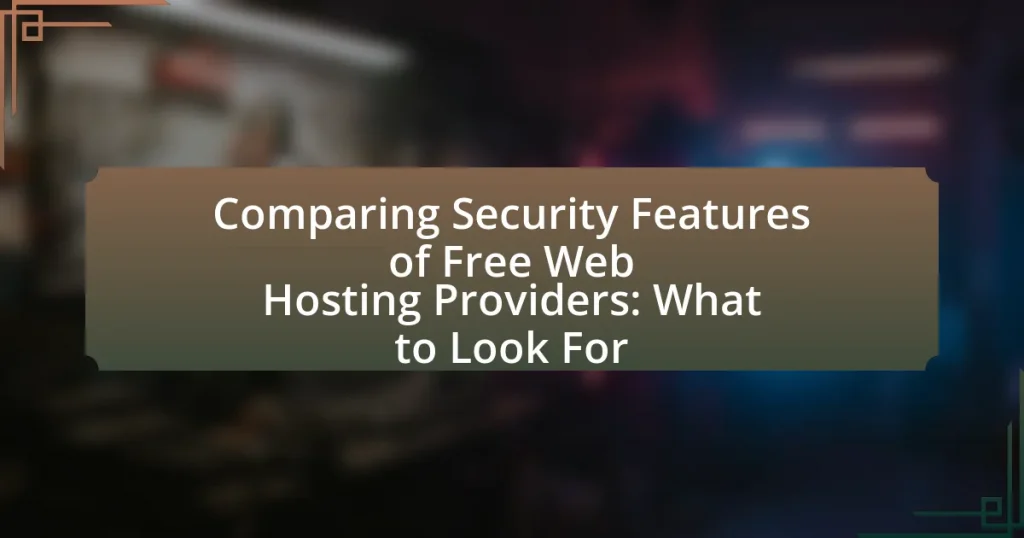The article focuses on comparing the security features of free web hosting providers, highlighting essential aspects such as SSL certificates, regular backups, malware scanning, and DDoS protection. It examines how these providers ensure data protection through encryption methods like SSL and TLS, and discusses their responses to data breaches. Additionally, the article outlines the risks associated with using free hosting services, the importance of strong security protocols, and best practices users can adopt to enhance their website security. By evaluating the security measures of various free hosting options, the article aims to guide users in making informed decisions regarding their web hosting needs.

What are the key security features to consider in free web hosting providers?
Key security features to consider in free web hosting providers include SSL certificates, regular backups, malware scanning, and DDoS protection. SSL certificates encrypt data transmitted between the user and the server, ensuring secure communication. Regular backups protect against data loss, allowing for recovery in case of an incident. Malware scanning helps identify and remove malicious software, maintaining the integrity of the website. DDoS protection mitigates the risk of distributed denial-of-service attacks, which can disrupt service availability. These features are essential for safeguarding sensitive information and ensuring reliable website performance.
How do free web hosting providers ensure data protection?
Free web hosting providers ensure data protection through various security measures, including data encryption, regular backups, and secure access protocols. These providers often implement SSL (Secure Socket Layer) encryption to protect data transmitted between users and servers, which helps prevent unauthorized access. Additionally, many free hosting services conduct regular backups to safeguard user data against loss due to server failures or cyberattacks. They also utilize secure access protocols, such as FTP over SSL, to enhance the security of file transfers. These practices collectively contribute to a more secure environment for users’ data.
What encryption methods are commonly used by free web hosting providers?
Free web hosting providers commonly use SSL (Secure Sockets Layer) and TLS (Transport Layer Security) encryption methods to secure data transmission. SSL and TLS protocols encrypt the data exchanged between users and the web server, ensuring that sensitive information remains confidential and protected from eavesdropping. Many free hosting services offer SSL certificates, often through Let’s Encrypt, which provides free SSL certificates to enhance security. This widespread adoption of SSL/TLS is supported by the fact that major web browsers now flag sites without HTTPS as insecure, prompting providers to implement these encryption methods to maintain user trust and comply with security standards.
How do free web hosting providers handle data breaches?
Free web hosting providers typically handle data breaches by implementing basic security measures, notifying affected users, and offering limited support. These providers often lack the resources for comprehensive security protocols, which can lead to vulnerabilities. In the event of a breach, they may inform users through email or their website, detailing the nature of the breach and any steps users should take. However, the effectiveness of their response can vary significantly, as many free services do not have dedicated security teams or incident response plans in place. This lack of robust security infrastructure increases the risk of data exposure and inadequate recovery efforts.
What types of security protocols should be implemented?
To ensure robust security in web hosting, implementing protocols such as HTTPS, SSL/TLS, and SSH is essential. HTTPS encrypts data transmitted between the user and the server, protecting sensitive information from interception. SSL/TLS protocols provide secure communication channels over the internet, safeguarding data integrity and confidentiality. SSH, or Secure Shell, is crucial for secure remote server access, allowing administrators to manage servers without exposing them to vulnerabilities. These protocols collectively enhance the security posture of web hosting services, making them vital for protecting user data and maintaining trust.
What is the importance of SSL certificates in free web hosting?
SSL certificates are crucial in free web hosting as they provide encryption for data transmitted between users and the website, ensuring security and privacy. This encryption protects sensitive information, such as login credentials and personal data, from being intercepted by malicious actors. Additionally, SSL certificates enhance a website’s credibility, as browsers display security indicators, like the padlock symbol, which can increase user trust. According to a study by Google, 85% of users are more likely to trust a website that uses HTTPS, which is enabled by SSL certificates. Therefore, the presence of SSL certificates in free web hosting is essential for safeguarding user data and fostering trust.
How do firewalls contribute to the security of free web hosting services?
Firewalls enhance the security of free web hosting services by monitoring and controlling incoming and outgoing network traffic based on predetermined security rules. They act as a barrier between trusted internal networks and untrusted external networks, preventing unauthorized access and potential attacks. For instance, firewalls can block malicious traffic, such as Distributed Denial of Service (DDoS) attacks, which are common threats to web hosting environments. According to a report by Cybersecurity Ventures, cybercrime damages are projected to reach $10.5 trillion annually by 2025, highlighting the critical role of firewalls in mitigating such risks. By implementing firewalls, free web hosting providers can significantly reduce vulnerabilities and protect user data from breaches.
What are the risks associated with using free web hosting providers?
Using free web hosting providers poses several risks, including limited security features, lack of customer support, and potential data loss. Limited security features often result in inadequate protection against cyber threats, as many free services do not offer SSL certificates or regular backups. The absence of reliable customer support can lead to prolonged downtime or unresolved technical issues, impacting website accessibility. Additionally, free hosting services may impose restrictions on data storage and bandwidth, increasing the risk of data loss or service interruption. These factors collectively compromise the overall reliability and security of websites hosted on free platforms.
How can users identify potential vulnerabilities in free web hosting?
Users can identify potential vulnerabilities in free web hosting by conducting thorough security assessments, including checking for outdated software, weak passwords, and lack of SSL certificates. Security assessments can be performed using tools like vulnerability scanners, which analyze the hosting environment for known security flaws. For instance, a study by the Ponemon Institute found that 60% of data breaches are linked to unpatched vulnerabilities, highlighting the importance of keeping software updated. Additionally, users should review the hosting provider’s security policies and practices, as well as user reviews and reports of past security incidents, to gauge the overall reliability and security of the service.
What are the implications of limited customer support on security?
Limited customer support significantly undermines security by delaying response times to vulnerabilities and incidents. When users encounter security issues, inadequate support can lead to prolonged exposure to threats, increasing the risk of data breaches. For instance, a study by the Ponemon Institute found that organizations with poor incident response capabilities face an average cost of $3.86 million per data breach, highlighting the financial implications of insufficient support. Furthermore, limited customer support may prevent users from receiving timely updates and patches, leaving systems vulnerable to exploitation. This lack of proactive assistance can ultimately compromise the overall security posture of web hosting services.

How do free web hosting providers compare in terms of security features?
Free web hosting providers generally offer limited security features compared to paid hosting services. Many free providers lack essential security measures such as SSL certificates, regular backups, and advanced firewalls, which are crucial for protecting websites from cyber threats. For instance, a study by HostingAdvice found that 70% of free hosting services do not provide SSL encryption, leaving user data vulnerable to interception. Additionally, free hosting often includes shared resources, increasing the risk of cross-site contamination from other users. Therefore, while free web hosting may be cost-effective, it typically compromises on security, making it less suitable for sensitive or business-critical applications.
What are the most secure free web hosting options available?
The most secure free web hosting options available include InfinityFree, 000webhost, and AwardSpace. InfinityFree offers free SSL certificates and a robust security system, ensuring data protection. 000webhost provides a secure environment with daily backups and a strong firewall, which helps prevent unauthorized access. AwardSpace features a free website builder with built-in security measures, including anti-malware protection. These platforms have established reputations for prioritizing user security, making them reliable choices for free web hosting.
How do user reviews reflect the security of different free web hosting providers?
User reviews reflect the security of different free web hosting providers by highlighting specific experiences related to data breaches, uptime reliability, and customer support responsiveness. For instance, users often report incidents of hacking or data loss, which can indicate vulnerabilities in a provider’s security measures. Additionally, reviews frequently mention the effectiveness of security features such as SSL certificates and firewalls, providing insight into how well these providers protect user data. A study by HostingAdvice in 2021 found that 65% of users prioritize security features when selecting a hosting provider, further emphasizing the importance of user feedback in assessing security.
What security certifications should users look for in free web hosting providers?
Users should look for security certifications such as SSL (Secure Socket Layer), PCI DSS (Payment Card Industry Data Security Standard), and ISO 27001 in free web hosting providers. SSL ensures encrypted connections between users and websites, protecting sensitive data during transmission. PCI DSS compliance is crucial for hosting providers that handle payment information, as it sets standards for securing card transactions. ISO 27001 certification demonstrates that a provider has implemented an information security management system, ensuring the protection of data and compliance with best practices. These certifications indicate a commitment to security and help users assess the reliability of free web hosting services.
How do the security features of free web hosting providers vary?
The security features of free web hosting providers vary significantly in terms of data protection, malware scanning, and support for SSL certificates. Some providers offer basic security measures like firewalls and limited DDoS protection, while others may include advanced features such as automated backups and regular security audits. For instance, providers like InfinityFree may lack robust security protocols, whereas others like 000webhost offer some level of malware scanning. Additionally, the availability of SSL certificates can differ, with some providers offering them for free and others requiring payment. This variability impacts the overall security posture of websites hosted on these platforms, making it crucial for users to assess the specific security features of each provider before making a choice.
What are the differences in security measures between popular free web hosting services?
Popular free web hosting services differ significantly in their security measures, impacting user data protection and website integrity. For instance, some services like InfinityFree and 000webhost offer basic security features such as SSL certificates and DDoS protection, while others like Freehostia provide more advanced options, including firewalls and malware scanning. Additionally, platforms like WordPress.com implement regular backups and security monitoring, enhancing their overall security posture. In contrast, services such as FreeWebHostingArea lack robust security protocols, making them more vulnerable to attacks. These differences highlight the importance of evaluating security features when choosing a free web hosting provider.
How do geographical locations affect the security of free web hosting providers?
Geographical locations significantly affect the security of free web hosting providers by influencing data sovereignty, regulatory compliance, and vulnerability to physical threats. Different countries have varying laws regarding data protection and privacy, such as the General Data Protection Regulation (GDPR) in the European Union, which mandates strict data handling practices. Hosting providers located in jurisdictions with robust legal frameworks are more likely to implement stringent security measures to comply with these regulations. Additionally, geographical factors can expose servers to natural disasters, political instability, or civil unrest, which can compromise the physical security of data centers. For instance, hosting services in regions prone to earthquakes or floods may face higher risks of service disruption and data loss. Thus, the geographical location of a free web hosting provider plays a crucial role in determining its overall security posture.

What best practices can users follow to enhance security on free web hosting platforms?
Users can enhance security on free web hosting platforms by implementing strong passwords, regularly updating software, and utilizing HTTPS. Strong passwords reduce the risk of unauthorized access, as studies show that 81% of data breaches are linked to weak passwords. Regular software updates patch vulnerabilities, which is crucial since 60% of breaches exploit known vulnerabilities. Utilizing HTTPS encrypts data transmitted between the user and the server, protecting sensitive information from interception. Additionally, users should avoid sharing sensitive information and regularly back up their data to mitigate potential losses from security incidents.
How can users protect their websites on free web hosting services?
Users can protect their websites on free web hosting services by implementing strong passwords, regularly updating software, and utilizing security plugins. Strong passwords reduce the risk of unauthorized access, while keeping software updated ensures that vulnerabilities are patched. Security plugins can provide additional layers of protection, such as firewalls and malware scanning. According to a study by the Cybersecurity & Infrastructure Security Agency, 80% of data breaches involve weak or stolen passwords, highlighting the importance of password strength in website security.
What role does regular software updates play in website security?
Regular software updates are crucial for website security as they patch vulnerabilities that could be exploited by attackers. These updates often include security fixes that address known weaknesses in the software, thereby reducing the risk of breaches. For instance, according to a report by the Cybersecurity & Infrastructure Security Agency (CISA), 85% of successful cyberattacks exploit known vulnerabilities for which patches are available. Therefore, consistently applying updates helps maintain a secure environment and protects sensitive data from unauthorized access.
How can users implement strong passwords and authentication measures?
Users can implement strong passwords and authentication measures by creating complex passwords that include a mix of uppercase letters, lowercase letters, numbers, and special characters, while also enabling two-factor authentication (2FA) for added security. Research indicates that passwords with at least 12 characters are significantly harder to crack; for instance, a study by the University of Cambridge found that longer passwords exponentially increase the time required for brute-force attacks. Additionally, using a password manager can help users generate and store unique passwords for different accounts, reducing the risk of password reuse, which is a common vulnerability. Implementing these strategies effectively enhances overall account security and protects sensitive information from unauthorized access.
What common mistakes should users avoid when using free web hosting?
Users should avoid several common mistakes when using free web hosting, including neglecting security measures, failing to read the terms of service, and not backing up data. Neglecting security measures can lead to vulnerabilities, as many free hosting services offer limited security features, making websites susceptible to attacks. Failing to read the terms of service can result in unexpected limitations or the loss of data ownership, as many free providers retain rights over user content. Not backing up data is critical because free hosting services may not provide reliable backup solutions, increasing the risk of data loss. These mistakes can significantly impact website performance and security.
How can neglecting security settings lead to vulnerabilities?
Neglecting security settings can lead to vulnerabilities by allowing unauthorized access and exploitation of system weaknesses. When security configurations are not properly set, attackers can easily bypass defenses, leading to data breaches, malware infections, and service disruptions. For instance, a study by the Ponemon Institute found that 60% of data breaches are linked to misconfigured security settings, highlighting the critical importance of maintaining proper security protocols.
What are the dangers of using outdated plugins and themes?
Using outdated plugins and themes poses significant security risks, including vulnerabilities that can be exploited by hackers. These outdated components often lack the latest security patches, making websites susceptible to malware, data breaches, and unauthorized access. For instance, a study by the SANS Institute found that 90% of successful cyberattacks exploit known vulnerabilities, many of which are found in outdated software. Additionally, outdated plugins and themes can lead to compatibility issues with newer versions of web platforms, resulting in site instability and potential downtime.
What practical tips can enhance security on free web hosting platforms?
To enhance security on free web hosting platforms, users should implement strong passwords and enable two-factor authentication. Strong passwords reduce the risk of unauthorized access, while two-factor authentication adds an additional layer of security by requiring a second form of verification. According to a study by the Cybersecurity & Infrastructure Security Agency, using multi-factor authentication can block 99.9% of automated attacks. Additionally, regularly updating software and plugins is crucial, as outdated versions often contain vulnerabilities that can be exploited by attackers. Regular backups of website data also ensure that users can restore their sites in case of a security breach.
